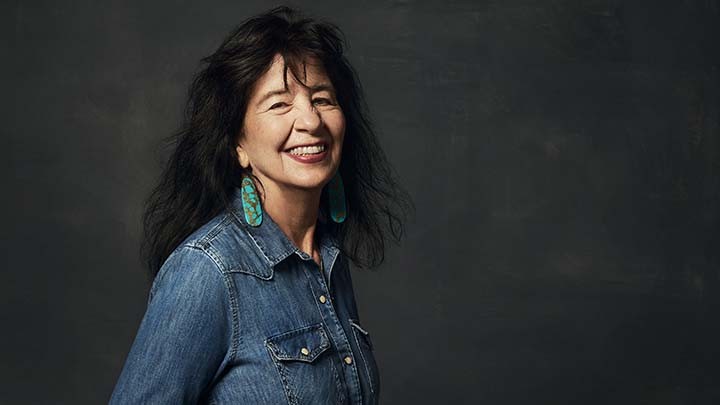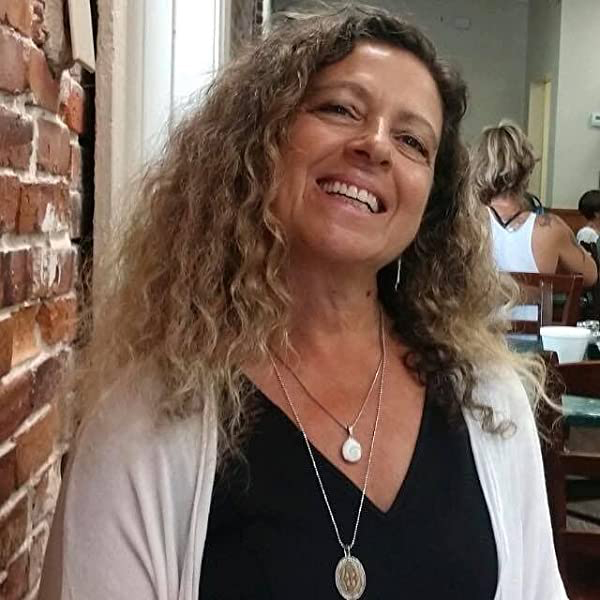Moderator’s Note: This post is presented as part of FAR’s co-operation with The Nasty Women Writers Project, a site dedicated to highlighting and amplifying the voices and visions of powerful women. The site was founded by sisters Theresa and Maria Dintino. This was posted on their site in 2021 and then again on March 21, 2023. You can see more of their posts here.

Healing hearts and nations is what Joy Harjo does. Standing up for justice is what Joy Harjo does. Joy Harjo is a teacher and leader for our times, for all times.
When she asks this question in her book, Poet Warrior:
“What do I do with this overwhelming need for justice in my family, for my tribal nation, for those of us in this country who have been written out of the story or those who appear to be destroyed or perverted by false story?” (46),
I say, you’re doing what you need to do and more, Joy Harjo! You’re addressing this overwhelming need for justice in ways that reverberate!
In 2022, Joy Harjo completed her third term as United States Poet Laureate, the first Native American to hold this position and only the second to serve three terms. While serving, she released Poet Warrior, offering us another slice of herself: her wisdom, her stories, and her poetry.

When Joy Harjo announced in 2021 that she was writing another memoir, I could not imagine anything that could rival her first one, Crazy Brave. But Poet Warrior meets that challenge and complements its predecessor well.
One concept that carries over from Crazy Brave is that of “the knowing,” discussed in an earlier post: Joy Harjo: “The Knowing” (Muscogee (Creek)- American, b. 1951):
“As I near the last doorway of my present life, I am trying to understand the restless path on which I have traveled. My failures have been my most exacting teachers. They are all linked by one central characteristic, and that is the failure to properly regard the voice of inner truth. That voice speaks softly. It is not judgmental, full of pride, or otherwise loud. It does not deride, shame, or otherwise attempt to derail you. When I fail to trust what my deepest knowing tells me, then I suffer. The voice of inner truth, or the knowing, has access to the wisdom of eternal knowledge. The perspective of that voice is timeless”(44).
Along with Harjo’s reminder to heed that inner voice we all have access to, she provides some instructions, maps, and ways to be in the world that will yield peace and good, and that will move us closer to where we want and need to be, individually and collectively:
“We keep our vibrations higher by prayer, by kindness, by taking care of what we were given to do, by cleaning ourselves of negative thoughts that originate within or come from others, by cleaning with water, by humility, by being in the real world, away from concrete and square buildings, by speaking only that which holds truth” (116).
The vibrations are indeed high in Poet Warrior. In it, Harjo speaks a truth that we can hear and understand.
For instance, the truth of one of many things taken from the Natives, and for the sake of all needs to be returned:
“When we were colonized, female deities were deliberately disappeared from our indigenous stories. There is no female figure in Christianity’s Trinity. Mothers lost their place next to the fathers. They were treated as property. Those roles in society filled by women and mothers, positions like teachers and childcare workers, became the least respected and valued even though they are the most crucial.
The word “mother” wants to take over this whole story, and there is no combination of words, sentences, or paragraphs that could carry that weight, the story, and how it was borne from one mother to the next, from generations, from the beginning” (89).
“Mothering,” the birthing, nurturing, guiding, is a distinct theme in this memoir, from Harjo’s biological mother and aunt, to other women who have guided her, especially as a poet.
Harjo explains and honors the connective tissue of art, the growing and building upon one another, and the importance of this. She begins with a woman she calls a mentor; a woman I had never heard about and am thrilled to have been introduced to:
“The novelist, poet, and activist Meridel Le Sueur, a child of the Midwest, became one of my earliest mentors…She wrote about the Depression, about breadlines, about the lives of the poor and women and others who voices were left out of the American story. The feminists rediscovered her in the early ‘70s and began to reprint and publish her writings, which ranged from novels to poetry to children’s books” (168).
Le Sueur’s story is an important one, as is her work. Her mentor role in Harjo’s life went beyond professional, a lifelong relationship of great significance. Since learning of Le Sueur, we’ve included two posts to our site: Meridel Le Sueur: An Unrelenting Voice of the People and Meridel Le Sueur Part II: Builder of Bridges.

Harjo also shares the impact writer and activist Audre Lorde had on her development, emphasizing the need for and the great power of poetry. Harjo shares:
“I had been using her [Lorde’s] poems as maps, the way some of our indigenous peoples used songs for star maps. They told me how to get from here to there, in a land of beautiful diversity as it existed within that perverted reality of racial and gender hate. It can be a tricky landscape, even trickier for women…
“She taught me that there is no separation between being a poet and being a mother and a lover. All are warrior roles. Audre Lorde’s wisdom songs folding into the consciousness of my poetry. They tell me to this day that there is no end to the quest for justice, for knowledge, and remind me to make poems to hold everything that slips past the failure of memory, of love” (175-178).
Harjo continues by acknowledging others on whose works and lives she builds:
“Every poem has poetry ancestors. My poetry would not exist without Audre Lorde’s “Litany for Survival,” without Mvskoke stomp dance call-and-response, without Adrienne Rich’s “Diving into the Wreck,” without Meridel Le Sueur or N. Scott Momaday, without death or sunrise, without Walt Whitman, or Navajo horse songs, or Langston Hughes, without rain, without grief, without –“ (183).
Amplifying Harjo’s point about the significance of those who came before is our post Invisible Connections: The Hidden Web of Women Writers.
Early on in this memoir, Harjo lets us in on the challenges and worries of her younger self, on her journey from “Girl Warrior” to “Poet Warrior,” and she admits:
“I decided right then, during those long nights, that if my creative work did anything in this world, I wanted Indians to be seen as human beings”(115).
That Harjo need articulate such an aim: helping human beings see other human beings as human, illustrates so blatantly how broken we are.
Harjo epitomizes the healing power of creativity, of music, of art, of poetry, of the way words can open us, move us, dig deepest into our minds and souls, and change us. How poetry moves us closer to ourselves, to what it means to be human, to feeling deep in our bones and bodies that we need one another and we need our Mother Earth.
There is so much I adore about Poet Warrior. Perhaps I’m writing about it too soon after reading, when instead I should be sitting still, continuing to absorb, contemplate, reflect, engage, and let the tears flow, the laughter emerge.


As I update this post, I’m elated to see that Joy Harjo has released two more books. One is a collection of her poems: Weaving Sundown in a Scarlet Light: Fifty Poems for Fifty Years. The other is a picture book, Remember, “an adaptation of the renowned poem that encourages young readers to reflect on family, nature, and their heritage,” illustrated by Michaela Goade. Both are on the top my reading list, for sure.
Joy Harjo is a #NastyWomanWriter.
© Maria Dintino 2021, 2023
Works Cited
Harjo, Joy. Poet Warrior. NY: W. W. Norton Company, Inc., 2021.

BIO: Maria Dintino has worked in higher education for over thirty years. While in graduate school, Maria became enamored with the Transcendentalists, especially Henry David Thoreau. Although introduced to Margaret Fuller then, she did not comprehend her undeniable significance until another encounter many years later. It is now clear to Maria that Fuller is destined to claim her rightful place in American herstory and one of Maria’s goals is to help her do so. Maria’s first work of creative nonfiction, The Light Above: A Memoir with Margaret Fuller has been recently published and she is at work on her second book. Contact Maria at mdintino477@aol.com.
Discover more from Feminism and Religion
Subscribe to get the latest posts sent to your email.


This is a stunning tribute to Joy Hart’s life and work. Beautifully written! Her understanding that suffering arises out of not listening to that inner voice – the voice of the authentic self helps us to understand where we might have strayed -when healing is authentic – oh there is so much I could respond to here that I could go on for pages. Thank you – KUDOS to The Nasty Writers Project!
LikeLiked by 1 person
Thank you, Sara. Appreciate what you share about Joy Harjo’s wisdom and your support for the mission of the Nasty Women Writers Project.
LikeLike
I so appreciate all that you highlighted in Joy Harjo’s Poet Warrior. Both Harjo and her mentors have been inspirations for me. I’m also glad to learn about your work on Margaret Fuller. I wrote my doctoral dissertation on Fuller, Frances Wright, and Sarah Grimke many decades ago. I’ll look forward to reading your book.
LikeLiked by 1 person
Thank you, Beth, for both your comment about the post on Harjo and your interest in my book.
LikeLiked by 1 person
I has the privilege of meeting her and seeing her perform with her band in Tulsa. Honestly, I was stars struck. She is truly a national treasure.
LikeLiked by 1 person
That’s fabulous, Jan! I would love to hear her play! I coordinated a reading and talk with Joy Harjo at Flagler College a few years back. It was phenomenal. Unfortunately, due to Covid, it had to be virtual, but still enlightening and inspiring. I agree, she a national and global treasure.
LikeLiked by 2 people